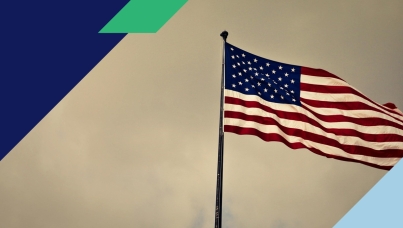Registered voters are feeling pessimistic about the state of the U.S economy
Washington DC, November 7, 2023
A new Yahoo Finance/Ipsos poll on economic outlooks among registered voters finds that overall, voters feel the U.S. economy is faring worse than usual in a variety of areas including job growth and inflation rates, and many are pessimistic that the situation will improve over the next 12 months. Additionally, nearly half of all voters say Biden’s policies and administrations have hurt their financial health, while less than one in five believe his policies have helped. For more, read Yahoo Finance's stories below:
3 Warning signs for Biden: Yahoo Finance-Ipsos poll
Yahoo Finance-Ipsos survey: This type of inflation is hurting Biden the most
What Americans get wrong about the Biden economy
Detailed Findings
In general, U.S. registered voters have a negative outlook on the health of the U.S. economy, and their own financial circumstances, with few believing that Biden’s policies have helped.
- When asked to evaluate how Americans in general have been feeling over the past two years, the largest share of registered voters believe most Americans have been falling behind (49%), with a nearly equal share saying they are barely keeping up (45%). Yet, despite their pessimistic outlook for the country as a whole, voters are a bit more positive about their own situation. Over one in four registered voters (27%) say they feel they themselves have been falling behind while nearly half of all registered voters feel they have barely been keeping up (49%). Just under one quarter feel they have been getting ahead (23%).
- On the whole, the majority of voters believe the U.S. economy is doing the same or worse relative to other developed nations (78%). Republicans in particular believe the U.S. economy is underperforming compared to other developed countries (53%). Additionally, two-thirds of voters (66%) believe the U.S. national debt has become a major problem that threatens the economy. Again, Republicans are most likely to view the government debt as a major problem relative to both Democrats and independents (88% vs. 44% and 67%, respectively).
- Voters are slightly more positive when it comes to the job market - half of all registered voters say the unemployment rate is about average at the moment, while about one quarter say it is unusually low (25%) or high (24%). Similarly, about half of registered voters (48%) say job growth over the last two years has been about average, though nearly three in ten voters (31%) say job growth has been unusually weak.
- Republicans are more likely than both Democrats or independents to say current unemployment rates are unusually high (39% vs. 12% and 22%, respectively), and job growth over the past two years has been unusually weak (48% vs. 12% and 32%, respectively). On the other hand, Democrats are the most likely to say current unemployment rates and job growth in the United States are about average (56% and 53%, respectively).
- Nearly half of all voters (46%) say Biden’s policies and administrations have hurt their financial health, while less than one in five believe his policies have helped (17%). However, answers vary widely by political affiliation.
- While a strong majority of Republicans believe Biden’s policies have hurt their financial health (84%), just 13% of Democrats say the same. Conversely, one-third of Democrats believe Biden’s policies have helped their financial health (37%), compared to 3% of Republicans. However, the largest share of Democrats (49%) also say Biden’s policies have had no effect on their financial circumstances.
- Overall, voters are split on how the U.S. economy will fair over the next 12 months – about one-third say the economy will stay about the same (35%), while another third believe the economy will get weaker (33%). Nearly one in four (23%) believe the U.S. will enter a recession.
- Republicans are more likely to believe the economy will get weaker (43%) or enter a recession (31%), while Democrats are more likely to say the economy will stay about the same (50%). Less than one in five voters, regardless of political affiliation, believe that the economy will get stronger.
Americans are feeling the impact of inflation and rising interest rates, particularly in the food and housing costs
- Regardless of political affiliation, a strong majority of registered voters say inflation over the last two years has been unusually high (88%). Inflated prices are widely affecting food prices, as over two-thirds of voters (67%) say this is the area they have seen most impacted by inflation. About one in 10 say gasoline or transportation costs (15%) or housing costs (12%) are where they have seen the biggest increases.
- The majority of voters believe inflation will continue to rise over the next 12 months (62%), though Democrats and independents are more likely than Republicans to believe inflation will remain stable (31% and 29% vs 19%, respectively).
- Voters vary in their opinions on the top contributing factor of current inflation rates. While one-quarter blame current government policies (27%), another quarter believe corporate greed is the largest contributor (26%).
- Answers vary significantly by political affiliation, as Republicans are most likely to blame current government policies (53%), while Democrats are more likely to attribute inflation rates to corporate greed (39%), or COVID-era disruptions to the economy (26%).
- Among those who believe current government policies are the top contributing factor of inflation, one-third (35%) specifically say policies that support green energy or remove support for the oil and gas industry are the biggest contributors. This belief is higher among Republicans (43%) and Independents (33%). About one in five voters believe aid for Ukraine and foreign aid are the biggest contributors (22%).
- As interest rates continue to rise, half of all voters (50%), and just over half of Republicans (55%) say they the most important factor about rising rates is that their costs to borrow money are going up. About one in five (22%) say they are more focused on their increased earnings on savings or investments.
- Among those most concerned about their rising costs to borrow money, housing costs (29%) are the primary area affected, followed by credit card costs (27%).
About the Study
This Ipsos poll was conducted between October 20-22, 2023, by Ipsos using the probability-based KnowledgePanel®. This poll is based on a nationally representative probability sample of 1,133 registered voters age 18 or older. The study included 328 Republicans, 372 Democrats, and 351 Independents.
The margin of sampling error for this study is plus or minus 3.1 percentage points at the 95% confidence level, for results based on the entire sample of registered voters. The margin of sampling error takes into account the design effect, which was 1.17 for all respondents. The margin of sampling error and design effects by the political affiliation sub-segments reported are:
|
|
Republicans |
Democrats |
Independents |
|
Margin of Sampling Error |
5.7% |
5.4% |
5.5% |
|
Design Effect |
1.10 |
1.13 |
1.11 |
In our reporting of the findings, percentage points are rounded off to the nearest whole number. As a result, percentages in a given table column may total slightly higher or lower than 100%. In questions that permit multiple responses, columns may total substantially more than 100%, depending on the number of different responses offered by each respondent.
The survey was conducted using KnowledgePanel, the largest and most well-established online probability-based panel that is representative of the adult US population. Our recruitment process employs a scientifically developed addressed-based sampling methodology using the latest Delivery Sequence File of the USPS – a database with full coverage of all delivery points in the US. Households invited to join the panel are randomly selected from all available households in the U.S. Persons in the sampled households are invited to join and participate in the panel. Those selected who do not already have internet access are provided a tablet and internet connection at no cost to the panel member. Those who join the panel and who are selected to participate in a survey are sent a unique password-protected log-in used to complete surveys online. As a result of our recruitment and sampling methodologies, samples from KnowledgePanel cover all households regardless of their phone or internet status and findings can be reported with a margin of sampling error and projected to the general population.
The data for the total sample were weighted to adjust for gender by age, race/ethnicity, education, Census region, metropolitan status, and household income. The demographic benchmarks came from the 2022 March Supplement of the Current Population Survey (CPS).
- Gender (Male, Female) by Age (18–29, 30–44, 45–59 and 60+)
- Race/Hispanic Ethnicity (White Non-Hispanic, Black Non-Hispanic, Other, Non-Hispanic, Hispanic, 2+ Races, Non-Hispanic)
- Education (Less than High School, High School, Some College, Bachelor or higher)
- Census Region (Northeast, Midwest, South, West)
- Metropolitan status (Metro, non-Metro)
- Household Income (Under $25,000, $25,000-$49,999, $50,000-$74,999, $75,000-$99,999, $100,000-$149,999, $150,000+)
- Party ID (Democrat, Republican, Independent, Something else)
For more information on this news release, please contact:
Jennifer Berg
Vice President, US
Public Affairs
+1 312 526 4224
[email protected]
About Ipsos
Ipsos is one of the largest market research and polling companies globally, operating in 90 markets and employing over 18,000 people.
Our passionately curious research professionals, analysts and scientists have built unique multi-specialist capabilities that provide true understanding and powerful insights into the actions, opinions and motivations of citizens, consumers, patients, customers or employees. Our 75 solutions are based on primary data from our surveys, social media monitoring, and qualitative or observational techniques.
Our tagline "Game Changers" sums up our ambition to help our 5,000 customers move confidently through a rapidly changing world.
Founded in France in 1975, Ipsos has been listed on the Euronext Paris since July 1, 1999. The company is part of the SBF 120 and Mid-60 indices and is eligible for the Deferred Settlement Service (SRD). ISIN code FR0000073298, Reuters ISOS.PA, Bloomberg IPS:FP www.ipsos.com



